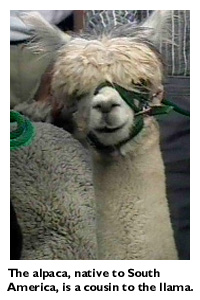|
Alpaca farms grow in U.S.
|
 |
August 15, 2000: 3:34 p.m. ET
One New York farmer says raising docile creatures is both rewarding and profitable
|
NEW YORK (CNNfn) - Until recently, Edward Boyd considered his farm in upstate New York an escape for his family, a place to retreat from the noise, filth and crime of New York City.
It was in 1994 that he decided to try his hand at farming on the 125-acre former dairy farm he has owned since the 1960s. He considered raising horses and other livestock before settling on an unusual, but increasingly popular, animal: the alpaca.
 Boyd, 86, is one of a growing number of alpaca farmers in the United States. According to the Alpaca Registry, the nation's herd has grown to nearly 30,000 this year, up from a paltry 1,330 in 1990. The number of owners has grown, too, from 146 in 1991 to 2,919 this year. Boyd, 86, is one of a growing number of alpaca farmers in the United States. According to the Alpaca Registry, the nation's herd has grown to nearly 30,000 this year, up from a paltry 1,330 in 1990. The number of owners has grown, too, from 146 in 1991 to 2,919 this year.
Boyd figures farmers and hobbyists are attracted to the docile South American creatures for the same reasons he found them appealing: alpacas have gentle dispositions, are easy to care for, and don't destroy the pastures they graze. Unlike other types of livestock, they have minimal space requirements, and up to 10 can live on as little as one acre of land.
Most important for people like Boyd, it is possible to turn a profit raising alpacas. After an initial investment of $55,000 for his first three alpacas, the Double E Alpaca Farm became profitable last year. In 1999, Boyd said he made about $50,000 selling fleece and auctioning some of his herd.
It's all in the fleece
The key to success in this industry: breeding and raising animals with a soft, lustrous pelt. The silky fleece can be made into fabrics that are as warm and durable as wool and nearly as soft as cashmere.
Boyd's son Brandon, the president of the Mid-Atlantic Alpaca Association, said in an appearance Tuesday on CNNfn's Market Call that raw fleece can fetch up to $12 an ounce in the United States, depending on color and  quality. Individual alpacas produce between five and 12 pounds of fleece every year, he said. quality. Individual alpacas produce between five and 12 pounds of fleece every year, he said.
Truly ambitious alpaca farmers can increase their profit by spinning the fleece themselves, said Brandon Boyd. Some artisans, he said, who knit sweaters or make blankets are among those who have taken to raising alpacas and using the fleece in their own products.
"How much you make really depends on the value you put into the product," said Brandon Boyd, noting that a man's alpaca sweater can sell for up to about $400.
It is believed the alpaca was domesticated thousands of years ago by the Incas. The Incas supposedly prized the fleece, which they spun and weaved into clothing for Incan nobility. Although they are native to the South American altiplano, the high plains of Bolivia, Peru and Chile, they adapt well to any climate.
According to the Alpaca Breeders and Owners Association in Estes Park, Colo., alpacas are being raised in all 50 states in the United States.
Stable herd, stable price
Though Boyd shears his 80-head herd every year and sells the raw fleece, he has learned that the real money is in selling the animals or leasing them out to other alpaca owners as studs. Female alpacas sell for between $12,500 and $40,000 and prized herd sires have fetched more than $100,000. Proven studs can command fees of up to $5,000.
Brandon Boyd said the price for an alpaca has remained stable over the last decade and he expects it will remain stables for a number of years because of the low reproductive rate of the alpaca herd in the United States. The United States has been closed to imports from South America since the end up 1998, so the growth of the herd now depends on the number of newborn alpacas within the nation's borders. Alpaca females generally give birth to one baby a year. At that rate, the herd is predicted to grow by about 22 percent a year.
Brandon Boyd, a Manhattan attorney, said he was skeptical at first about his father's plan for the farm. It sounded a little to him like earlier farm fads like the ostrich craze that went essentially nowhere. He said he looked over the business with his "lawyer's eye" and truly believes it to be a worthwhile venture.
Though he tried to be analytical and business-wise about raising alpacas, Brandon Boyd admits that somewhere along the way he has become completely smitten with the gentle, sweet creatures.
"There really is something about them that just draws you in," he said. 
|
|
|
|
|
 |

|

